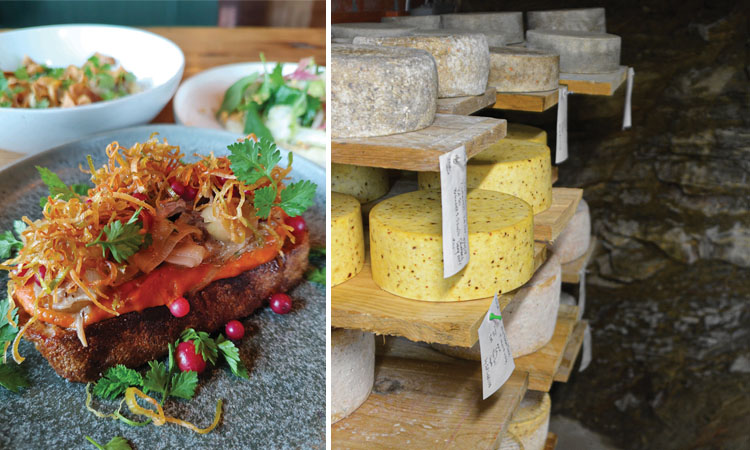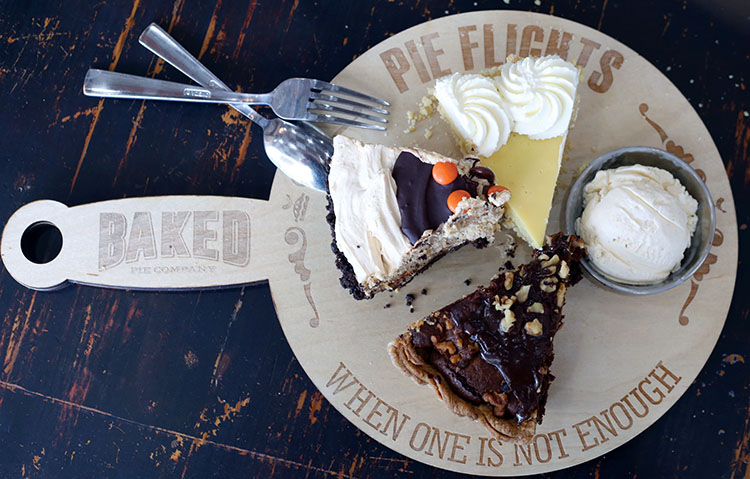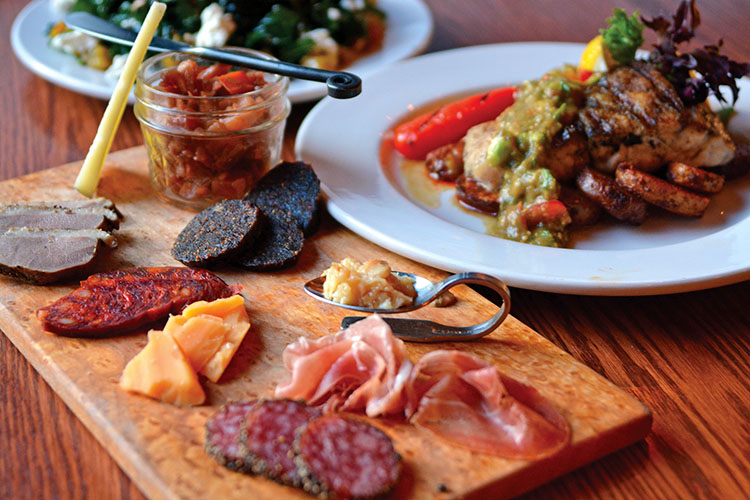Last Updated on May 3, 2023
With the recent boom in demand for organic produce, meat, and farm-to-table restaurants, Western North Carolina has become a hotbed for independent, natural food products. Between handcrafted beer using local ingredients, fresh meat from grass-fed cattle, fine wines, fruits, and vegetables, the possibilities are as endless as they are available.
Here’s a quick introduction to the region’s attractive culinary scene, straight from the mouths of its creators.
Local ingredients are growing on us
The seven-acre Pitch Pine Organic Farm in Penrose (just outside of Brevard) is situated on one of the most pristine stretches of soil in WNC. In early 2014, co-owners/founders Paige Witherington and Justin Dansby brought their longtime dream of operating their own sustainable farm to fruition. Since then, their business has grown quickly.
“Western North Carolina is on the fast track. It’s light years beyond where other places are with organic farming and farm-to-table, and it will just continue. The key is to get more consumers educated and on board,” Dansby said. “And the extension services are fantastic around here. A lot of that comes from the original tobacco and apple farms and the networks they created here.”
Katie Moore, manager at the Blue Ridge Mountain Creamery in Fairview, shares a passion of helping consumers experience local terroir. Tucked against a mountainside in a deep holler, her small creamery has been creating some of the finest local cheese for almost a decade.
“Every cow we get milk from is unique. Everyone’s cheese is unique,” Moore said. “With these smaller farms, you’re getting milk from certain cows that are eating certain foods, breathing certain air, drinking certain water, walking in certain soil, so that milk has a certain flavor that then becomes part of the cheese.”
Aside from running the BRMC, Moore also is the executive director of the WNC Cheese Trail and the director of the Carolina Mountain Cheese Fest. The trail began in 2012 and now consists of 9 cheesemakers around the region. It also includes dozens of farm stops and associate members (restaurants, breweries, cideries, cheese stores, and tailgate markets).
“What I love about doing this is that it ties into a lot of things that are important to me: being in touch with the land, being in touch with the food, supporting artisanal methods, and working hard to preserve our farmland,” Moore said. “It’s this idea of upholding traditions that’s important, especially with food. I also think our farmland is incredibly important, and these cheesemakers actually help smaller farms stay in operation.”
The secret ingredient to success
And so the culinary scene of the region continues to expand, and palates become more sophisticated. With that, the passion and love restaurant chefs, owners, and servers put into every meal come from the mere fact that they all reside in WNC—a place they are proud to call home.
“Everything we serve is made in-house, with everything as fresh as possible,” said Eric Scheffer, owner and executive chef of Vinnie’s Neighborhood Italian. “And it’s about creating an approachable and comfortable setting, where everybody knows each other, this environment of good food and great conversation.”
With two locations in Asheville, Scheffer is at the helm of a restaurant that is regarded as the gold standard of Italian culinary delights in WNC. And since its opening more than 10 years ago, it’s been voted the finest Italian spot in the city—every single year.
Scheffer remembers those iconic Italian restaurants of his native Brooklyn and Long Island. There, the sheer vibrancy of the people inside and the dishes served conjured a deep sense of love and connection, whether you were a loyal customer or first-time visitor, something he’s applied to Vinnie’s.
“You’re walking in, and you have the great smell of eggplant parmesan wafting through the room. And for a lot of people, walking in is like going home again,” Scheffer said. “It’s that sense of neighborhood and community that I remember as a kid in New York, which is something we have here in Asheville, too. You walk down the street, and out of the 10 people you passed, you knew at least three of them.”
Just down the road, the wildly popular Luella’s Bar-B-Que in North Asheville specializes in North Carolina-style barbecue (vinegar based sauce, with a dash of honey, garlic, and tomatoes). But barbecue lovers will also find Texas-style brisket, a St. Louis dry rub for the smoked turkey breast, and their signature New Orleans/Creole andouille sauce. Looking around at Asheville’s ever growing culinary reputation, it doesn’t surprise Luella’s owner/pitmaster Jeff Miller that the city has become a “foodie hotspot” for the Southeast and beyond.
“The food scene has changed dramatically here, and I think the quality of food and the dining experience in this city has shifted greatly,” Miller said. “There’s always been a lot of variety and creativity in the Asheville food scene, but I feel that every place is hitting those standards found in other great food cities. More and more people are moving here and visiting here, and the expectations have been raised. And we’re meeting and exceeding those expectations.”
But local restaurants are doing more than simply mixing up new flavors and techniques. Featuring made-from-scratch pie crusts and fillings, the Baked Pie Company in Arden and Woodfin also aims to perpetuate the long-held traditions of baking. These skills used to be passed down between generations, but are rapidly disappearing in the modern era.
“These skills and foods will be gone soon if nobody keeps the traditions alive,” said owner/baker Kirsten Fuchs. “For people like myself, you have these vivid memories of being a kid and being in the kitchen. I remember being in my great aunt’s kitchen, just watching her and her sisters bake all these wonderful creations. And we’d be sitting there, learning how they did it and would help out when we could.”
WNC’s rise to culinary capital
Over the past decade, there has been a food revolution across the region. Along every downtown, you’ll find anything from Cajun to French, Asian to Italian, Mexican to Mediterranean. Whether it’s local establishments incorporating different dishes into the menus, or the troves of culinary artisans relocating here, the desire to try something new and different is all around in this land of cosmopolitan country cuisines.
As a result of its cosmopolitan approach towards the menu and its commitment to using local ingredients, Frogs Leap Public House in downtown Waynesville is regarded as a cornerstone of fine dining in the mountains of WNC.
“Nearly every item on our menu will come out of the local market,” said executive chef/owner Kaighn Raymond. “We work with many local farmers and different purveyors, and we’ve always been here to help those purveyors grow. If you have those fresh, local ingredients for the level of fine dining use, then we’re willing to help support you.”
Raymond sees the region’s culinary rise in sophistication mirror a greater national shift. Still, the change has been a result of deliberation and hard work.
“It’s been a 30-year process in the culinary industry to get to this point in fine dining in America. There was a sentiment then that nothing made in America was at the level of European fine dining,” Raymond noted. “All of these chefs and fine dining restaurants have tried to bring back those great American ingredients because so many delicious things from our own country got lost along the way. Now, those ingredients are becoming part of the American culture again, and people are excited to try those things.”
“Culture” is indeed a keyword, along with “community”. Tucked away in the thick forests below the Green River is the small town of Saluda. At the center of the quaint, cozy downtown is The Purple Onion.
“When we started, we were hoping to create a gathering place for people to come together, enjoy good conversation, good food, and live music,” said Susan Casey, former owner of The Purple Onion. “And it really is better than I ever dreamed it could be, in a lot of ways. It’s such a pleasure to be in there and see people enjoy themselves.”
As The Purple Onion enters its third decade of operation, Casey couldn’t be prouder of what the business stands for: “good conversation, good food, and live music.” It’s a testament to her vision, and the community as a whole, which has supported the restaurant since day one.
“It’s a great deal of satisfaction,” Casey said. “It makes me happy to work hard to create something like this, and when it works, it’s very satisfying. It makes the hard work worth it to be in the midst of that. We feel really lucky to be part of this community.”
This post is adapted from Allen Tate/Beverly-Hanks’ annual Welcome to Western North Carolina magazine. Request your free copy today.







